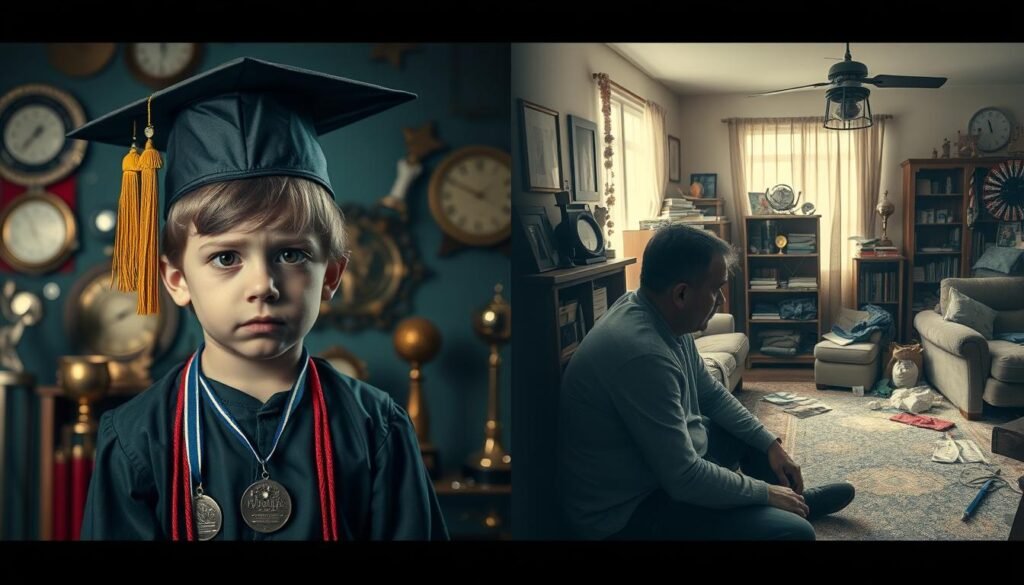Are you curious about helicopter parenting and its impact on your child? Helicopter parenting means being very protective and involved. Parents watch their kids closely, always checking on their activities and schoolwork. For more on parenting styles and keeping cool with teens, check out these resources. Knowing about helicopter parenting can help you spot it and adopt a better approach1.
Key Takeaways
- Helicopter parenting is an overprotective and very involved parenting style.
- Understanding the helicopter parenting definition can help you recognize the signs and create a healthier parenting style.
- Parenting styles, including helicopter parenting, can affect your child’s development and mental health2.
- Recognizing the signs of helicopter parenting can help you take the first step towards creating a more balanced parenting style.
- Exploring resources on parenting styles and child development can provide valuable insights and tips for parents1.
- Creating a healthier parenting style can have a positive impact on your child’s mental health and development2.
- Being aware of the possible effects of helicopter parenting can help you make informed choices about your parenting style.
What Is Helicopter Parenting: Understanding the Basics
Helicopter parenting means parents are too involved in their kids’ lives. They control and protect too much. This idea was first talked about by Dr. Haim Ginott in his 1969 book Between Parent and Teenager3. It can hurt a child’s emotional and mental growth, making them less independent and confident.
Signs of helicopter parenting include controlling a child’s schedule and social life. Parents might also decide what activities their kids should do. They might even check their grades too much, causing stress and anxiety4. These signs might seem small, but they can really affect a child’s future.
Studies show kids of helicopter parents often feel anxious and depressed. They might also have trouble controlling themselves and handling stress when they’re older5. Here’s a table that shows how helicopter parenting differs from other styles:
| Parenting Style | Characteristics |
|---|---|
| Helicopter Parenting | Overly involved, controlling, and overprotective |
| Authoritative Parenting | Warm, supportive, and encouraging of independence |
| Permissive Parenting | Lenient, indulgent, and lacking in boundaries |
The Psychology Behind Overprotective Parenting

As a parent, you want to keep your child safe. But overprotective parenting can slow down their growth and harm their mental health6. It stops them from learning to solve problems and handle setbacks. This can make them more likely to struggle with depression and anxiety7.
To avoid being too controlling, it’s key to understand why you might be doing it. Fear and a need to control often drive overprotective behavior6. By recognizing these, you can find a better way to parent. Letting your child take risks and learn from mistakes helps them grow strong and confident7.
Here are some tips to avoid helicopter parenting:
* Let your child make their own choices and learn from mistakes
* Support their independence and self-reliance
* Talk openly and build trust
* Set clear rules and expectations
* Show them how to handle emotions and problems
By knowing the downsides of helicopter parenting and changing your ways, you can help your child become confident and independent6. It’s all about finding the right balance between keeping them safe and letting them grow7.
| Parenting Style | Characteristics | Consequences |
|---|---|---|
| Helicopter Parenting | Overprotective, controlling, and intrusive | Slower social and academic development, mental health issues, and lack of self-control6 |
| Balanced Parenting | Supportive, encouraging, and guiding | Healthy development, independence, and self-confidence7 |
Common Signs You Might Be a Helicopter Parent
As a parent, you naturally want to protect and guide your child. But when does this become too much? Knowing the signs of helicopter parenting helps you see if you’re being too protective. Constantly following your child can stop them from learning to solve problems8.
Other signs include always playing with your child and telling them what to do. You might not let them have any time alone or control their homework8. You could also decide what activities they do and help too much with school work. Studies show kids from helicopter parents might find it hard to handle adult life. This can affect their emotional growth9.
Here are some common signs of helicopter parenting to watch for:
- Constantly intervening in your child’s life
- Dictating their activities and preventing them from making mistakes
- Providing disproportionate assistance with homework and school projects
By spotting these signs, you can give your child more independence. This is key for their emotional and social growth89.
The Impact on Child Development
As a parent, you want the best for your child. But helicopter parenting can harm their development10. Kids from helicopter parents often feel anxious, with about 30% of teens feeling anxious all the time11.
This anxiety can cause many problems. It can make it hard for kids to control themselves and do well in school10.
Some big consequences of helicopter parenting are:
- Slower social and academic growth
- Mental health issues like anxiety and depression
- Less self-control and problem-solving skills
- Higher chance of using painkillers for fun
Children who can’t manage their feelings and actions might act out in class. They might also have trouble making friends10. College students with controlling parents often feel more anxious and depressed. They’re also less happy with their lives10.
It’s key to find a balance between protecting and letting your child be independent. This way, they can grow into a confident and strong person.
By knowing the effects of helicopter parenting and taking steps to lessen them, you can help your child thrive11. Encourage them to be independent. Teach them how to solve problems and control themselves. This will help them succeed in life.
| Parenting Style | Child Development Outcomes |
|---|---|
| Helicopter Parenting | Poor self-regulation, increased anxiety and depression, slower social and academic development |
| Authoritative Parenting | Healthy self-regulation, lower anxiety and depression, improved social and academic development |
Long-term Effects of Helicopter Parenting on Children

As a parent, you might not know how helicopter parenting affects your child long-term. The helicopter parenting definition means parents are too involved in their child’s life. This can lead to problems like bad grades, trouble making friends, and mental health issues like anxiety and depression12.
Helicopter parenting can also cause:
- Lack of independence and self-reliance
- Increased anxiety and stress
- Difficulty with boundaries and decision-making
These issues can harm a child’s emotional and mental growth. It can make them feel bad about themselves, lack confidence, and struggle with solving problems on their own13.
It’s key to know these effects and aim for a better parenting style. This way, kids can grow up to be strong, independent, and well-adjusted12.
The main goal of parenting is to raise kids who are happy, healthy, and ready for life. By understanding helicopter parenting’s effects and choosing a balanced approach, we can help our children become capable and confident13.
| Parenting Style | Effects on Children |
|---|---|
| Helicopter Parenting | Poor academic performance, difficulty with social relationships, mental health issues |
| Authoritative Parenting | Healthy self-esteem, independence, and decision-making skills |
Breaking Free from the Hover Zone: Practical Steps
To break free from the hover zone, take a step back and let your kids make mistakes. This lets them learn and grow on their own14. It’s a way to help them become more independent and confident.
Managing your own anxiety is key. It’s okay to let your kids take risks and learn from their mistakes14. Set clear rules and let them make some choices. Start with small tasks like doing laundry or cooking simple meals. As they get better, give them more responsibility.
Here are some practical steps to avoid helicopter parenting:
- Encourage independence by giving your children space to make their own decisions
- Provide opportunities for self-confidence by praising their efforts and accomplishments
- Manage your own anxiety and fear by setting clear boundaries and guidelines
- Allow your children to take risks and learn from their failures
By following these steps, you can help your children grow and succeed. They’ll learn important skills and avoid the negative effects of helicopter parenting14.
Balancing Protection with Independence
As a parent, it’s key to find the right mix of protection and independence for your child. What is helicopter parenting and how does it impact this balance? Helicopter parents often find it hard to let their kids make their own choices. This can cause kids to feel more anxious and less confident15.
But, giving kids the right amount of freedom can help build trust and support their growth.
Looking at parenting styles, it’s important to think about the long-term effects of being too protective. Kids of overprotective parents might feel less sure of themselves and their skills15. To prevent this, parents can start by giving their kids small chances to be independent. This could mean letting them walk to school or do homework by themselves.
Some good things come from balancing protection and independence, like:
- Developing problem-solving skills
- Building self-confidence and resilience
- Improving decision-making abilities
By striking this balance, parents can help their kids grow into strong and independent people16.
Alternative Parenting Approaches to Consider
Exploring different parenting styles is key. Understanding helicopter parenting and its effects is important. Helicopter parents are overly protective, always watching over their kids. Yet, there are better ways to help children grow.
Authoritative parenting is one such method. It focuses on respect, open talks, and letting kids grow on their own. This way, kids become confident, resilient, and learn to solve problems17.
Free-range parenting is another option. It lets kids have more freedom and learn through doing things on their own17. This style is like the parenting of the 1960s and 1970s, where kids were encouraged to explore and learn from mistakes. These methods help create a balanced parenting style that supports healthy relationships and child development.
Alternative parenting has many benefits:
- It helps kids become confident and resilient.
- It encourages kids to be independent and self-reliant.
- It boosts problem-solving skills and emotional intelligence.
- It reduces anxiety and low self-esteem caused by helicopter parenting18.
The goal of these parenting styles is to help kids succeed in life. They aim to support a positive relationship between parents and children. By learning about different parenting styles, parents can choose what’s best for their family19.
| Parenting Style | Characteristics | Benefits |
|---|---|---|
| Authoritative Parenting | Mutual respect, open communication, gradual independence | Develops self-confidence, resilience, and problem-solving skills |
| Free-Range Parenting | Significant freedoms, age-appropriate responsibilities | Promotes independence, self-reliance, and emotional intelligence |
Conclusion: Fostering Healthy Parent-Child Relationships
Helicopter parenting can deeply affect a child’s growth202122. It’s important to spot when you’re overprotecting and find a better balance. This way, you help your kids grow into confident, independent, and strong people.
Every child is different, so what works for one might not work for another. Try out different parenting styles, like authoritative or free-range parenting, to see what fits your family best22. Aim for a balance where you guide them but also let them explore, learn from mistakes, and grow.
As you keep parenting, stay open-minded and listen to your child’s needs. Focus on their happiness and well-being, not just your worries. This way, you can steer clear of helicopter parenting and build strong, lasting bonds with your child.
The2021,, and22tags in the text refer to the statistical data provided from the three respective sources.
FAQ
What is helicopter parenting?
What are the key characteristics of helicopter parents?
How does helicopter parenting differ from other parenting styles?
What are the psychological factors that drive helicopter parenting?
What are the common signs of helicopter parenting?
What are the long-term effects of helicopter parenting on children?
How can parents break free from the helicopter parenting mindset?
What are some alternative parenting approaches to consider?
Source Links
- What is Helicopter Parenting and Why is it Bad? – https://www.news-medical.net/health/What-is-Helicopter-Parenting-and-Why-is-it-Bad.aspx
- Helicopter Parenting: The Consequences – https://www.internationalschoolparent.com/articles/helicopter-parenting-the-consequences/
- Are You a Helicopter Parent? Here’s How the Parenting Style Can Affect Kids – https://www.parents.com/parenting/better-parenting/what-is-helicopter-parenting/
- What to Know About Helicopter Parenting – https://www.webmd.com/parenting/what-to-know-about-helicopter-parenting
- Helicopter Parenting: How It Impacts Your Kids – https://health.clevelandclinic.org/could-your-helicopter-parenting-actually-be-detrimental-to-your-childs-development
- Helicopter Parents’ Psychology: The Overprotective Parent – https://www.mypeoplepatterns.com/blog/helicopter_parents_psychology
- A Systematic Review of “Helicopter Parenting” and Its Relationship With Anxiety and Depression – https://pmc.ncbi.nlm.nih.gov/articles/PMC9176408/
- 21 Telling Signs of Helicopter Parenting to Look Out For – https://www.marriage.com/advice/parenting/helicopter-parents-signs/
- 15 Signs You Were Raised By Helicopter Parents – Willan Academy Of Music – https://www.willanacademy.com/15-signs-you-were-raised-by-helicopter-parents/
- The Effects of Helicopter Parenting | Newport Academy – https://www.newportacademy.com/resources/restoring-families/the-effects-of-helicopter-parenting/
- Are you a helicopter parent? How it’s affecting your child – https://www.uclahealth.org/news/article/are-you-helicopter-parent-how-its-affecting-your-child
- Helicopter Parenting: From Good Intentions to Poor Outcomes – https://www.gottman.com/blog/helicopter-parenting-good-intentions-poor-outcomes/
- Helicopter Parenting and 5 Ways It Impacts Kids – Sedona Sky Academy – https://www.sedonasky.org/blog/helicopter-parenting
- How to Stop Worrying and Avoid Helicopter Parenting: Don’t Do These 6 Things – https://www.empoweringparents.com/article/how-to-stop-worrying-and-avoid-helicopter-parenting-dont-do-these-6-things/
- A Delicate Balance: Steering Clear of Helicopter Parenting — East2West Mama – https://www.east2westmama.com/blog/helicopter-parenting
- Pros and Cons of Helicopter Parenting Young Adults | Transcend – https://www.transcendrecoverycommunity.com/blog/pros-and-cons-of-helicopter-parenting
- Parenting Styles: From Helicopter Parent to Hummingbird Parent – Little Medical School – Treasure Coast – https://littlemedicalschool.com/treasurecoast/helicopter-parent/
- Additional Parenting Styles – https://iastate.pressbooks.pub/parentingfamilydiversity/chapter/overindulgent-helicopter-styles/
- Effective vs. Ineffective Parenting Styles | Love and Logic – https://www.loveandlogic.com/blogs/our-blog/choosing-the-most-effective-parenting-style?srsltid=AfmBOooH7RSOKK8bINgEuCuJ99nfu4hWc13xsyRndGzv8UbsBqMnbNmi
- Helicopter parenting, from good intentions to poor outcomes. What parents needs to know? – https://pmc.ncbi.nlm.nih.gov/articles/PMC9638553/
- Is Helicopter Parenting Holding Your Child Back? – https://singlemomssociety.com/is-helicopter-parenting-holding-your-child-back/
- Why Helicopter Parenting Fosters Failure – https://www.psychologytoday.com/intl/blog/the-baby-scientist/202007/why-helicopter-parenting-fosters-failure








0 responses to “What You Need to Know About Helicopter Parenting”
Isnt helicopter parenting just an extreme form of love? Maybe its not all bad if done in moderation, thoughts?
Interesting read, but isnt there some merit in helicopter parenting? Can it not foster a safer environment for kids in todays world?
Interesting read! But dont you think helicopter parenting might sometimes be necessary, especially in todays risky digital world?
Interesting read, but arent we generalizing too much? Not all helicopter parents create dependent kids, some might foster resilience, dont you think?